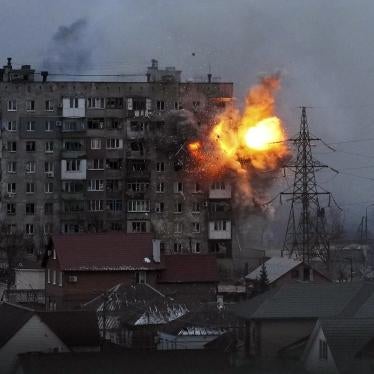Thank you, Chairman.
Section 2, the political declaration’s legal section provides an opportunity to address some of the legal issues related to this document.
Some states have expressed concern that the political declaration will create new law. It does not and in fact cannot since it is a non-binding policy document. But a political declaration that simply restates and calls for compliance with existing law has no added value.
As the title indicates the purpose of the declaration is to strengthen the protection of civilians. The chapeau of the operative section specifies that goal should be achieved by commitments that both strengthen compliance with international humanitarian law and address the humanitarian consequences arising from the use of explosive weapons in populated areas.
The two parts of the preamble reflect these two interrelated ways to advance protection of civilians.
Section 2 includes restatements and reaffirmations of relevant international legal obligations, whose compliance should be strengthened. Such provisions are common elements of political declarations. They ground the document in the law, giving the document added weight, but cannot be read in isolation.
Section 1, as already discussed, outlines the fundamental problem that the commitments must also address—i.e., humanitarian consequences of explosive weapons in populated areas, whether direct or reverberating effects.
On a related note, I would also like to specifically address the contention of some states that the political declaration should focus on the “indiscriminate use” of explosive weapons in populated areas. Narrowing the subject of the declaration in this way would distract from the larger humanitarian issue and reduce the instrument’s effectiveness.
An emphasis on indiscriminate use is problematic on multiple fronts. First, indiscriminate use is already unlawful under international humanitarian law, and thus a declaration dedicated to it would add little to existing legal protections. Second, directing commitments exclusively at the indiscriminate use of explosive weapons in populated areas implies that other use is acceptable. Evidence shows, however, that the use of explosive weapons, especially with wide area effects, in populated areas, causes a foreseeable pattern of harm regardless of the practice’s legality. Finally, the concept of indiscriminate use can become politicized because it draws on legal determinations states make about their opponents, including non-state armed groups.
A political declaration should instead deal broadly with the humanitarian consequences associated with the use of explosive weapons in populated areas. The declaration should adopt policy commitments that respond comprehensively to the foreseeable harm that motivated states to begin the process toward a new instrument. Promoting compliance with international humanitarian law is part of the solution, but not all of it. The declaration should enhance the protection of civilians from the range of adverse impacts, not just the effects of indiscriminate use.
Thank you.








